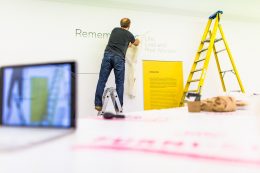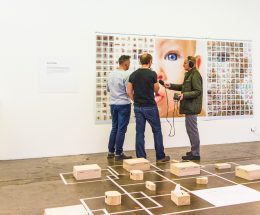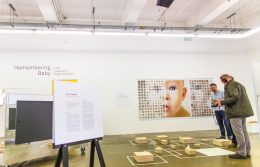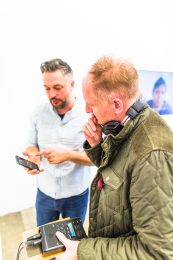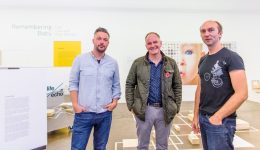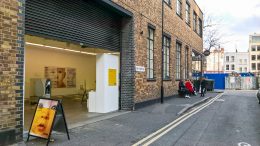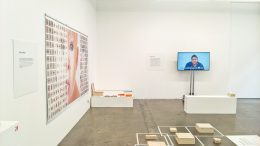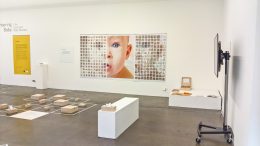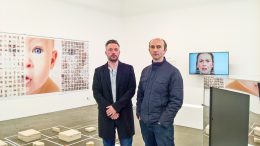Justin Wiggan has produced two new sound pieces for the Remembering Baby: Life, Loss and Post-Mortem exhibition which is inspired by research currently taking place at The University of Sheffield. Funded by the Economic and Social Research Council, this research and the associated exhibition aims to understand how parents and families who have experienced early-life loss feel about, and experience, the post-mortem process. In particular, the project seeks to explore the emerging use of Magnetic Resonance Imaging (MRI) in post-mortem, examining its role in the development of less invasive approaches to examination.
Justin has worked collaboratively with participants who have experienced early-life loss, using adapted versions of his Life Echo ‘Memory Atlas’ to create recordings inspired by their experiences and memories. These new pieces represent phonic memory triggers of hope, loss, love and legacy, and they translate a myriad of complex and challenging memories (actual and imagined) into sound.
About the Echoes
In their own words, the parents who collaborated with Justin to create the new sound echoes remember their babies. They describe their experiences of loss and reflect on being involved in the Life Echo process.
Lost Boy
I was a working mum of a two-year-old boy, and was going through a normal, healthy pregnancy, struggling with the usual morning sickness and living on Tic Tac mints and Rich Tea biscuits. Everything made me nauseous – the smell of the dishwasher and even the sound of children’s TV. Then, from nowhere, I was taken ill, rushed to hospital and told that my tiny baby had died. I went through labour, and said goodbye to my sweet, only just forming, baby boy. He was the size of my hand. My two-year-old went with my parents to the beach for a family birthday party. I waited to be collected from the ward. Then I was home and with my little son, my comfort. It was only years later that I told him about my other boy, his lost brother, who I had called Noah. Justin has used ‘literal’ sounds from my story and found sounds from my ‘imagined’ future for my lost boy. I am amazed at how he has combined them with more abstract sounds, like birdcalls, which so deftly capture feelings of helplessness, loss and aching. And after the misery, a sense of hope for the future, sunlight after the storm, the joy of the baby girl I went on to have. At times, the process of being involved in the making of my sound memory has floored me. But this memorial is a powerful and unexpected way to honour my lost boy. There is no gravestone or tree for him, but now there is this, and I am so thankful.
Louisa Hope
Our beautiful second child, Louisa Hope, was born in Sheffield in October 2003. Our eldest daughter, Natasha, was aged 3 and very ready to be a Big Sister. We knew before Louisa was born that she had Down’s syndrome and despite some apprehensions about that, we knew as soon as we met her that this was no barrier to loving her and embracing family life with her. We also knew there was some unexplained fluid round her heart but it was only after she was born that it became clear she had a rare form of leukaemia. She spent three days in a Neonatal Intensive Care Unit on a ventilator and undergoing intensive treatment. She died peacefully in Julia’s arms, with Robin holding Julia and Natasha. At the suggestion of hospital staff, we brought Louisa home with us for a few days. So it was that she did come to the house she would have lived in. Natasha held her and showed her round, played with her and brushed her hair. It was heartbreaking yet we felt so proud of them both. Help and support came from family and friends, even while they grieved Louisa’s loss for themselves. We are not religious in a conventional sense so opted to hold our own funeral ceremony for Louisa. This included heartfelt contributions through poetry, reflections and, in the case of Robin’s father, a piano composition entitled Cradle Song for Louisa Hope, which draws on the rhythm of her name and a Bach chorale ‘Es ist genug’. Louisa has just turned 14. We have found that grief can be very isolating and bleak, but we have found sharing with others who have been bereaved both humbling and helpful. Louisa is now a big sister herself, together with Natasha, to two more girls, Sophia and Nadia. We continue to honour Louisa’s place in the family and, with family members, gather each autumn to celebrate her birthday, visiting her nearby woodland grave, placing flowers and making a cake in the shape of something we think she’d have liked. Taking part in this Life Echo process and contributing to the Remembering Baby exhibition is one way of doing this. It adds a positive layer to Louisa’s memory for us and gives us an opportunity to do something for her which we greatly appreciate. We have found it very moving to revisit our memories and keepsakes, and to reflect on how Louisa continues to make an impact in our hearts and minds.
